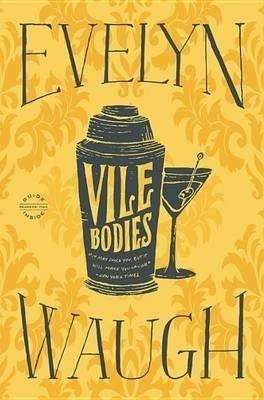VILE BODIES by Evelyn Waugh, Book Review: Classic satire
Evelyn Waugh’s second novel, Vile Bodies is his tribute to London’s smart set. It introduces us to society as it used to be but that now is gone forever, and probably for good.
Vile Bodies Synopsis:
The Bright Young Things of 1920s Mayfair, with their paradoxical mix of innocence and sophistication, exercise their inventive minds and vile bodies in every kind of capricious escapade, whether it is promiscuity, dancing, cocktail parties, or sports cars. A vivid assortment of characters, among them the struggling writer Adam Fenwick-Symes and the glamorous, aristocratic Nina Blount, hunt fast and furiously for ever greater sensations and the hedonistic fulfilment of their desires.
Evelyn Waugh’s acidly funny and experimental satire shows a new generation emerging in the years after the First World War, revealing the darkness and vulnerability beneath the glittering surface of the high life. (Audible)
Unabridged Audiobook, Narrator: Robert Hardy. Length: 5 hours and 51 minutes, Publisher: AudioGO Ltd.
Genre: Literature, Drama, Classics, Humour, Historical, Audio
Disclosure: If you click a link in this post we may earn a small commission to help offset our running costs.
BOOK REVIEW
I just loved the audiobook version of Evelyn Waugh’s Decline and Fall narrated by Michael Maloney – match the right narrator with a satirical work and the result can be something truly special. That experience heavily influenced my decision to choose the audiobook format of Waugh’s subsequent novel Vile Bodies.
Like it’s predecessor Decline and Fall, Vile Bodies is an unashamedly dark satire. Waugh’s target this time are the ‘bright young things’, the self-consciously fashionable young set that became known for their outrageous behaviour and frivolous spending in their continued search for new experiences after World War I.
One of the delights in this novel is the outlandish characters (and their names), from the daring and adventurous Miss Agatha Runcible to the scatterbrain Lottie Crump, Miles Malpractice, Kitty Blackwater and Fanny Throbbing, Mary Mouse, American evangelist Mrs Melrose Ape and her troupe of Angels (with personalities quite the opposite of their names Charity, Chastity, Humility, Prudence, etc), prime minister Mr Outrage and his much gossiped about predilections, and many others.
Miss Runcible wore trousers and Miles touched up his eye-lashes in the dining-room of the hotel where they stopped for luncheon. So they were asked to leave.
One of my personal favourites was the mutterings of the exiled King of Ruritania.
Audio format
But it was the sheer number of characters that led to issues with this audio format for me.
I persisted with Robert Hardy’s narration of Vile Bodies until about a third of the way through before deciding to read an ebook copy instead. I found it difficult to distinguish between Hardy’s performance of the different characters and volume variations became annoying. In this case, I felt the audio narration was limiting the value I was extracting from the piece rather than enhancing it.
Success in this world depends on knowing exactly how little effort each job is worth.
While I felt Vile Bodies was not quite as polished as Decline and Fall, it is a must-read for fans of satirical literature. It was far ahead of its time in highlighting the hypocrisy within society and the looming longer-term impacts of the devil-may-care attitude taken by the younger generation after the first World War.
BOOK RATING: The Story 4 / 5 ; The Writing 4 / 5 ; Audio 2 / 5 ; Overall 4
Get your copy of Vile Bodies from:




This review counts towards my participation in the Back to the Classics Challenge 2015 and the 2015 Audio Book Challenge.
About the Author, Evelyn Waugh
Arthur Evelyn St. John Waugh (28 October 1903 – 10 April 1966), known as Evelyn Waugh, was an English writer of novels, travel books and biographies. He was also a prolific journalist and reviewer. His most famous works include the early satires Decline and Fall (1928) and A Handful of Dust (1934), and the novel Brideshead Revisited (1945).


